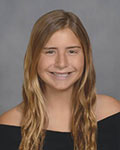
The prestigious Barry M. Goldwater Scholarship is awarded to undergraduate sophomores and juniors planning on research careers in natural sciences, mathematics, or engineering. SfN is proud some of its members are Goldwater Scholarship Award Winners. This series features three SfN members who are 2017 winners to showcase their accomplishments and offer other undergraduate members interested in conducting research a chance to learn from their experiences. Here, Kimberly Bress of the University of Tennessee, Knoxville shares her insights.
When did you decide to pursue neuroscience for your undergraduate studies? What led you to making that decision?
From the very beginning of college, I knew that I wanted to study the brain, so I declared my neuroscience major at freshman orientation. I am pursuing a self-designed major, “Neuroscience and Mental Health,” through the University of Tennessee College Scholars Program. I follow a curriculum developed with guidance from faculty mentors across multiple university departments, taking classes in neurobiology, psychology, cognitive neuroscience, social work, and counseling. Although my studies are primarily focused in the discipline of neuroscience, my unique curriculum allows me to explore the interdisciplinary applications of this complex and far-reaching field.
What does your research focus on, and what are your responsibilities?
For the past three and a half years, I have served as an undergraduate researcher in the Cooper Behavioral Neuroscience Laboratory. Our lab studies the behavioral, neural, and endocrine factors that regulate social stress using a social defeat model in Syrian hamsters.
I work with graduate student Brooke Dulka to specifically study the effects of social defeat stress on activity in specific brain regions. Last semester, with guidance from Brooke and our PI Matthew Cooper, I studied the effects of social defeat stress on the ventral hippocampus, looking to see if the level of stress-induced activation in this region would be modulated by an animal’s social status.
Besides the Goldwater Scholarship, do you have other scholarships or fellowships to conduct this research?
I am very grateful to be a member of the Haslam Scholars Program and College Scholars Program at the University of Tennessee. These two honors programs have provided me with a great deal of support, not only funding but also generous mentorship. My research experiences would not be what they are without all of the guidance which I receive from these groups.
How do you balance time in the lab with all of your classes and any extracurricular activities that you do?
Working in the lab is one of my main (and most time consuming) responsibilities, but I truly enjoy it. When I am in the lab, there is always something new to learn, a question to answer, or a problem to solve. My mentors, including Matthew Cooper, Brooke Dulka, and senior undergraduates who trained me during my first few semesters, have taught me that science is engaging and collaborative. Our lab has a great sense of community, and I am very grateful for that. Besides research, I also serve as a backpacking expedition leader with the university’s Center for Leadership and Service and play oboe in the Symphonic Band. These activities are definitely a lot to juggle, but I wouldn’t have my college experience any other way!
What is one challenge you’ve encountered trying to achieve this balance, and what is your approach to being as productive for and present in all of your school commitments?
One of the biggest challenges is trying to not be discouraged by the learning curve. When I first began studying neuroscience, and during my first semester in the lab, I was constantly overwhelmed by the amount of information that I did not understand. I really struggled with this, until I learned to be more comfortable asking questions. Once I took initiative to understand our lab’s research and really dedicated myself to mastering my neuroscience course material, I became less overwhelmed and more curious. There will always be something new to learn, whether it be a concept, technique, or an entirely new area of research. Figuring out how to navigate the learning curve has been important for turning my academic stress into something that is motivating and productive.
What is one piece of advice that you would offer other undergraduates who are thinking about or who are already doing lab research to help them be successful?
My most important piece of advice would be to find a good mentor — someone who answers your questions and really engages you in the research process. Research is a collaborative activity, and mentorship is a key part of learning how to be a good scientist and peer. I am very lucky to have mentors who are constantly teaching, explaining, and advising. My relationships with senior undergraduates, graduate students, and PIs has made research a positive experience, and that is a lesson that I will carry with me for the rest of my career.
Also read An Undergraduate Research Story: Part Two and An Undergraduate Research Story: Part Three.
Speaker






